Freakonomics
A Rogue Economist Explores the Hidden Side of Everything
Revised and Expanded Edition
Steven D. Levitt
and
Stephen J. Dubner

Contents
: The Hidden Side of Everything
. What Do Schoolteachers and Sumo Wrestlers Have in Common?
. How Is the Ku Klux Klan Like a Group of Real-Estate Agents?
. Why Do Drug Dealers Still Live with Their Moms?
. Where Have All the Criminals Gone?
. What Makes a Perfect Parent?
. Perfect Parenting, Part II; or: Would a Roshanda by Any Other Name Smell as Sweet?
: Two Paths to Harvard
In the summer of 2003, the New York Times Magazine sent Stephen J. Dubner, an author and journalist, to write a profile of Steven D. Levitt, a heralded young economist at the University of Chicago.
Dubner, who was researching a book about the psychology of money, had lately been interviewing many economists and found that they often spoke English as if it were a fourth or fifth language. Levitt, who had just won the John Bates Clark Medal (a sort of junior Nobel Prize for young economists), had lately been interviewed by many journalists and found that their thinking wasnt very robust , as an economist might say.
But Levitt decided that Dubner wasnt a complete idiot. And Dubner found that Levitt wasnt a human slide rule. The writer was dazzled by the inventiveness of the economists work and his knack for explaining it. Despite Levitts elite credentials (Harvard undergrad, a PhD from MIT, a stack of awards), he approached economics in a notably unorthodox way. He seemed to look at the world not so much as an academic but as a very smart and curious explorera documentary filmmaker, perhaps, or a forensic investigator or a bookie whose markets ranged from sports to crime to pop culture. He professed little interest in the sort of monetary issues that come to mind when most people think about economics; he practically blustered with self-effacement. I just dont know very much about the field of economics, he told Dubner at one point, swiping the hair from his eyes. Im not good at math, I dont know a lot of econometrics, and I also dont know how to do theory. If you ask me about whether the stock markets going to go up or down, if you ask me whether the economys going to grow or shrink, if you ask me whether deflations good or bad, if you ask me about taxesI mean, it would be total fakery if I said I knew anything about any of those things.
What interested Levitt were the riddles of everyday life. His investigations were a feast for anyone wanting to know how the world really works. His singular attitude was evoked in Dubners resulting article:
As Levitt sees it, economics is a science with excellent tools for gaining answers but a serious shortage of interesting questions. His particular gift is the ability to ask such questions. For instance: If drug dealers make so much money, why do they still live with their mothers? Which is more dangerous, a gun or a swimming pool? What really caused crime rates to plunge during the past decade? Do real-estate agents have their clients best interests at heart? Why do black parents give their children names that may hurt their career prospects? Do schoolteachers cheat to meet high-stakes testing standards? Is sumo wrestling corrupt?
Many peopleincluding a fair number of his peersmight not recognize Levitts work as economics at all. But he has merely distilled the so-called dismal science to its most primal aim: explaining how people get what they want. Unlike most academics, he is unafraid of using personal observations and curiosities; he is also unafraid of anecdote and storytelling (although he is afraid of calculus). He is an intuitionist. He sifts through a pile of data to find a story that no one else has found. He figures a way to measure an effect that veteran economists had declared unmeasurable. His abiding intereststhough he says he has never trafficked in them himselfare cheating, corruption, and crime.
Levitts blazing curiosity also proved attractive to thousands of New York Times readers. He was beset by questions and queries, riddles and requestsfrom General Motors and the New York Yankees and U.S. senators but also from prisoners and parents and a man who for twenty years had kept precise data on his sales of bagels. A former Tour de France champion called Levitt to ask his help in proving that the current Tour is rife with doping; the Central Intelligence Agency wanted to know how Levitt might use data to catch money launderers and terrorists.
What they were all responding to was the force of Levitts underlying belief: that the modern world, despite a surfeit of obfuscation, complication, and downright deceit, is not impenetrable, is not unknowable, andif the right questions are askedis even more intriguing than we think. All it takes is a new way of looking.
In New York City, the publishers were telling Levitt he should write a book.
Write a book? he said. I dont want to write a book. He already had a million more riddles to solve than time to solve them. Nor did he think himself much of a writer. So he said that no, he wasnt interestedunless, he proposed, maybe Dubner and I could do it together.
Collaboration isnt for everyone. But the two of themhenceforth known as the two of us decided to talk things over to see if such a book might work. We decided it could. We hope you agree.
As we were writing Freakonomics, we had grave doubts that anyone would actually read itand we certainly never envisioned the need for this revised and expanded edition. But we are very happy, and grateful, to have been wrong.
So why bother with a revised edition?
There are a few reasons. The first is that the world is a living, breathing, changing thing, whereas a book is not. Once a manuscript is finished, it sits, dead in the water, for nearly a year until it is made ready by the publisher for its debut. This doesnt pose much of a problem if you have written, say, a history of the Third Punic War. But because Freakonomics explores all sorts of modern real-world issues, and because the modern world tends to change quite fast, we have gone through the book and made a number of minor updates.
Also, we made some mistakes. It was usually a reader who would bring a mistake to our attention, and we very much appreciate this input. Again, most of these changes are quite minor.
The most aggressively revised section of the book is the beginning of chapter 2, which tells the story of one mans crusade against the Ku Klux Klan. Several months after Freakonomics was first published, it was brought to our attention that this mans portrayal of his crusade, and of various other Klan matters, was considerably overstated. (For a fuller explanation, see an essay called Hoodwinked?.) As unpleasant as it was to acknowledge this error, and to diminish the reputation of a man beloved in many quarters, we felt it was important to set straight the historical record.
We have also futzed a bit with the architecture of the book. In the original version, each chapter was preceded by an excerpt from the New York Times Magazine profile that one of us (Dubner) wrote about the other (Levitt), and which led to our collaboration on this book. Because some readers found these excerpts intrusive (and/or egomaniacal, and/or sycophantic), we have removed them, instead reprinting the complete Times profile in the back of this edition in the section called Bonus Material. There, it can be easily skipped over if one so chooses, or read in isolation.
The further bonus material is what accounts for our having called this edition expanded in addition to revised. Soon after the original publication of Freakonomics, in April 2005, we began writing a monthly column for the New York Times Magazine. We have included in this edition several of these columns, on subjects ranging from voting behavior to dog poop to the economics of sexual preference.

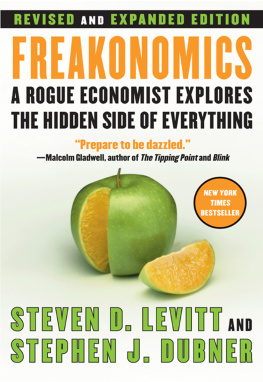
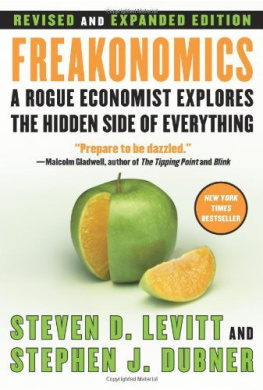
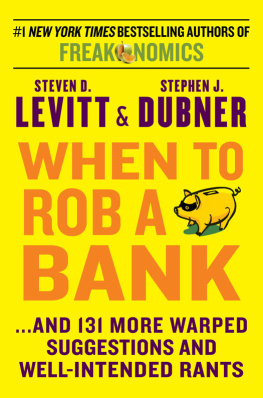
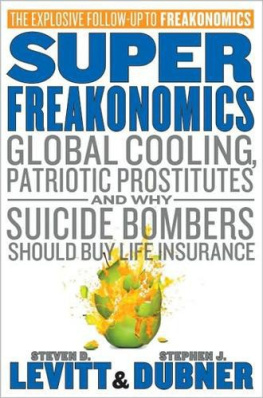
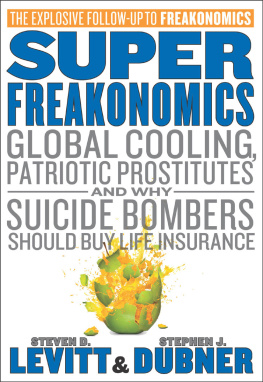
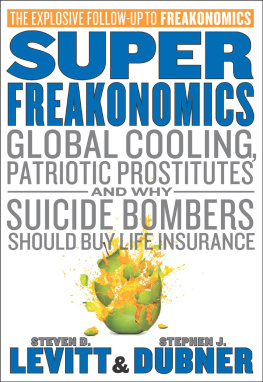

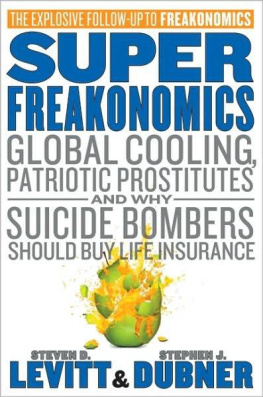
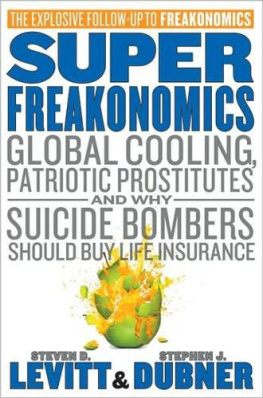
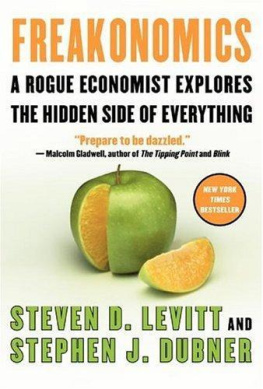
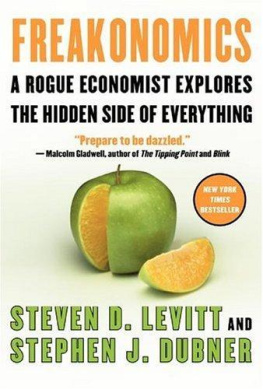
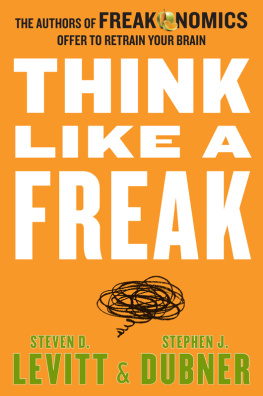
![Dubner Stephen J. - Super freakonomics : [global cooling, patriotic prostitutes and why suicide bombers should buy life insurance]](/uploads/posts/book/76604/thumbs/dubner-stephen-j-super-freakonomics-global.jpg)
